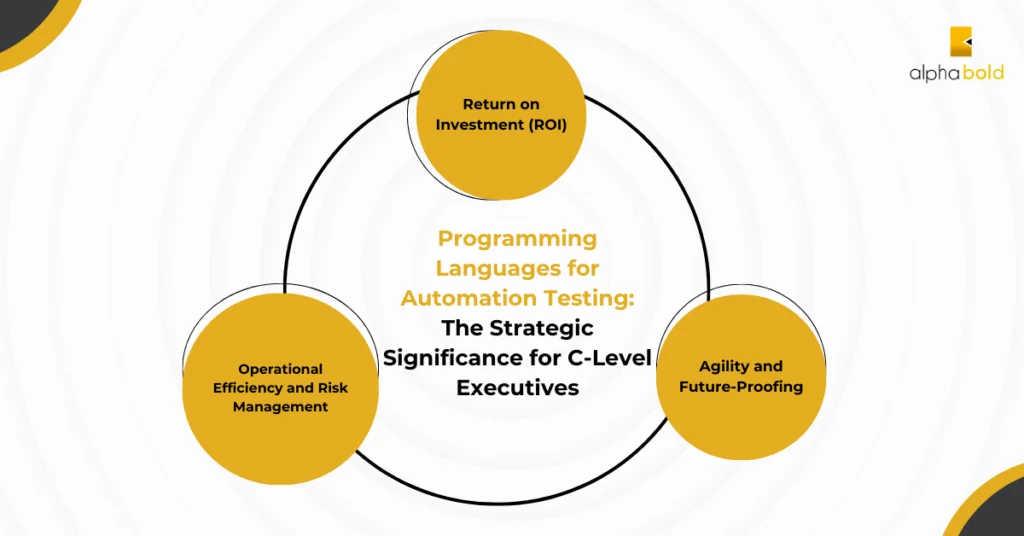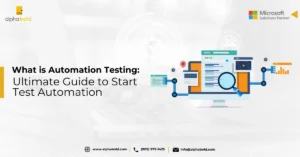Introduction
Achieving high-end quality and efficiency of our applications is paramount. Automation testing has emerged as a pivotal practice in achieving this goal and adapting to the increasing complexity of software systems while striving for faster delivery cycles. Enter the crucial player: best programming languages for automation testing. It’s not merely about coding; it’s a strategic decision that can shape productivity, cost-efficiency, and the overall triumph of software endeavors.
Automation testing has become an indispensable practice ensuring the quality and efficiency of applications. With the increasing complexity of software systems and the need for faster delivery cycles, automation testing plays a crucial role in streamlining the testing process. Choosing the right programming languages for automation testing is essential to implement automation testing across the software development lifecycle. Selecting a programming language often depends on specific project requirements, testing frameworks and tools in use, and the team’s expertise. Here, we delve into five popular programming languages for automation testing:
- Python: Python has experienced remarkable growth over the past five years, boasting a substantial increase of 7.8%, while Java faced a decline of 5.2%. This significant rise positions Python at the forefront, solidifying its reputation as one of the top programming languages for automation testing. Its strength lies in its straightforward and easily comprehensible syntax, augmented by an extensive ecosystem of libraries and frameworks like Selenium and PyTest. Additionally, Python stands out because it supports various test automation frameworks, including Robot Framework and Behave.
- Java: Java is another popular choice for automation testing. It has a mature ecosystem with numerous testing frameworks and libraries, such as JUnit and TestNG. Java offers object-oriented solid programming capabilities and is widely used in enterprise environments. Java holds the highest position as the most searched technology in 80 out of 162 countries globally, constituting a market share exceeding 50% within these nations.
- JavaScript: JavaScript is primarily known as a client-side scripting language for web development but is also extensively used for automation testing. With frameworks like Selenium WebDriver and libraries like Mocha and Jasmine, JavaScript allows for efficient and powerful web testing.
- Ruby: Ruby is often favored by testers due to its simplicity and readability. It has a user-friendly syntax and a popular testing framework called RSpec. Ruby also has a Cucumber framework that facilitates behavior-driven development (BDD) and supports test automation.
- C#: C# (pronounced C-sharp) is commonly used in Microsoft-centric environments, particularly for testing applications built on the .NET framework. It provides a robust set of tools and libraries, including NUnit and MSTest, making it a solid choice for automation testing in Windows-based environments.
Further Reading: Understanding The Differences: Automation Testing Vs. Manual Testing
Programming Languages for Automation Testing: The Strategic Significance for C-Level Executives

- Return on Investment (ROI): ROI is paramount for C-level executives, particularly CFOs and CIOs. The choice of a programming language is not merely technical; it translates into hours spent on training, ease of integration with existing systems, and the longevity of the technology. A language like Python, with its simplicity, can reduce training time, while Java’s robustness may promise fewer system breakdowns, leading to cost savings in the long run.
- Agility and Future-Proofing: As businesses undergo digital transformations, agility becomes critical. CIOs and CTOs need to anticipate shifts in technology and customer demands. The modularity of languages like Java or the extensive libraries of Python can position a company to be more responsive to change. Making the right choice here can future-proof the business, ensuring that systems remain up-to-date with minimal disruptions.
- Operational Efficiency and Risk Management: Seamless automation testing can expedite product releases, reduce downtimes, and enhance customer satisfaction. From a risk management perspective, particularly for CROs (Chief Risk Officers), ensuring rigorous testing can mitigate potential system failures, security breaches, or compliance issues. The right programming language is foundational to these operational outcomes.
Further Reading: Codeless Automation Testing: The Solution To All The Testing Challenges?
Partner with AlphaBOLD
Realizing the strategic implications of automation testing for C-Level executives demands the right partner. At AlphaBOLD, we seamlessly integrate technical excellence with C-level priorities. Ready to embark on this journey?
Request a ConsultationLeveraging Expertise from Automation Testing Service Providers
In the vast landscape of software development and testing, a strategic partnership with a specialized automation testing service provider can be invaluable for C-level executives. These providers come with a wealth of expertise, having worked across industries and having faced diverse challenges. For a CEO or CTO, this external vantage point can offer unique insights that internal teams might overlook. Service providers can analyze an organization’s current tech stack, workflows, and goals, and then recommend the most fitting programming languages and frameworks. Additionally, they can provide predictive analytics on future tech trends, ensuring that C-levels make informed, forward-looking decisions. Furthermore, for CFOs, partnering with these service providers can lead to cost efficiencies; by leveraging the provider’s specialized tools and methodologies, organizations can potentially reduce redundancies and accelerate testing processes. In essence, a collaboration with a seasoned automation testing service provider not only ensures top-tier technical implementation but also strategic guidance that aligns with the broader business vision and objectives.
Conclusion
The selection of programming languages for automation testing is a pivotal choice that intersects with various strategic considerations. It’s not just about the code; it’s a decision with profound implications on ROI, organizational agility, and operational efficiency. As highlighted, choices made here resonate across the C-suite, from CFOs assessing cost implications to CIOs and CTOs gauging technological robustness and future readiness. Real-life case studies further underline the tangible impacts of these decisions, revealing both challenges and triumphs. Furthermore, as technology continues to evolve, staying abreast of emerging trends in automation testing will be crucial. A forward-looking approach, aided by insights from seasoned partners, becomes essential. At this juncture, consider exploring AlphaBOLD’s specialized automation testing services. With our proven track record, we position ourselves as the guiding hand for C-level executives in their pursuit of the right framework, ensuring enduring software excellence and business success.
Are you ready to build your apps for success?
With AlphaBOLD quality assurance services make your apps bug-free. Request a personalized demo to see for yourself!
Request a ConsultationExplore Recent Blog Posts








